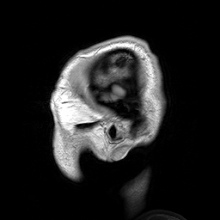Pengguna:Neptunerover/ABI sandbox

- Lihat juga: Brain injury (disambiguation)
An acquired brain injury (ABI) is brain damage caused by events after birth, rather than as part of a genetic or congenital disorder. It usually affects cognitive, physical, emotional, social or independent functioning and can result from either traumatic brain injury (e.g. physical trauma due to accidents, falls, assaults etc.) or nontraumatic injury derived from either an internal or external source (e.g. stroke, brain tumours, infection, poisoning, hypoxia, ischemia, encephalopathy or substance abuse). Most definitions of ABI exclude neurodegenerative disorders.
Acquired brain injury is not to be confused with intellectual disability. People with a brain injury may have difficulty controlling, coordinating and communicating their thoughts and actions, but they retain their intellectual abilities. However, the intellectual abilities of a person with a brain injury are likely to be interfered with by the aforementioned thought coordination and communication difficulties, which can make it difficult for them to express themselves in a manner intelligible to others, which in turn might offer the perception of a damaged intelligence to others, even though such is not the case.
Pada dasarnya, otak kita membolehkan kita untuk mencapai tiga perkara - untuk berfikir, untuk bergerak, dan merasa. Yang diperolehi kecederaan otak boleh mengganggu proses kognitif, aktiviti fizikal dan fungsi sosial.
–The ABI Handbook[1]
While research has demonstrated that thinking and behavior may be altered in virtually all forms of ABI, brain injury is itself a very complex phenomenon having dramatically varied effects.[1] Tidak ada dua orang boleh mengharapkan keputusan yang sama atau kesukaran. The brain controls every part of human life: physical, intellectual, behavioral, social and emotional. When the brain is damaged, some part of a person's life will be adversely affected. Even a mild injury can sometimes result in a serious disability that will interfere with a person’s daily functioning and personal activities for the rest of their life. Such interferences require a major life adjustment around the person's new circumstances, and making that adjustment is a critical factor in recovery and rehabilitation.[1]Sementara keputusan daripada kecederaan yang diberikan bergantung pada sifat dan tingkat keparahan kecederaan itu sendiri, rawatan yang tepat memainkan peranan penting dalam menentukan peringkat pemulihan.
Lihat pula[sunting | sunting sumber]
|
Symptoms: [2] |
Behavioral Manifestations: [2] |
Rujukan[sunting | sunting sumber]
- ^ a b c The ABI Handbook, Serving Students with Acquired Brain Injuries in Higher Education, The Consortium for the Study of Programs for the Brain Injured in the California Community Colleges, 1997, California Community Colleges
- ^ a b "A Head Injury Primer" from Osborn, Claudia L. Over my head: A doctor's own story of head injury from the inside looking out. Andrews McMeel Publishing (1998)
